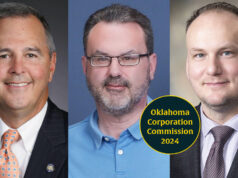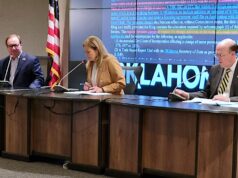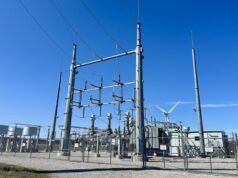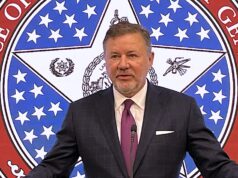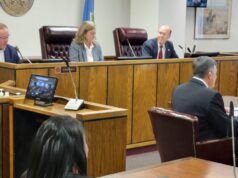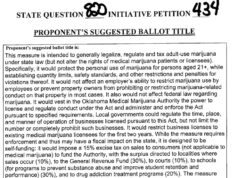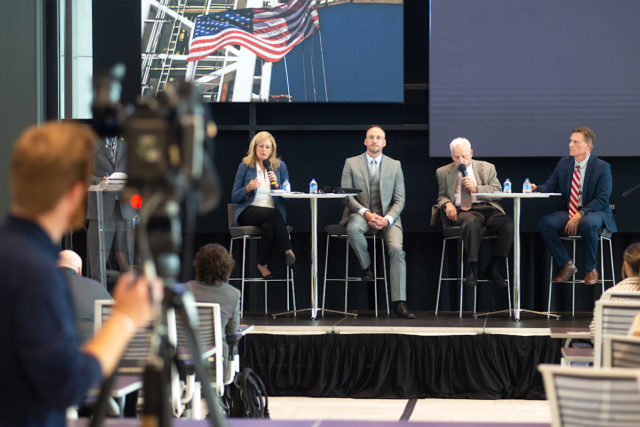

Sen. Kim David (R-Porter) and former Rep. Todd Thomsen (R-Ada), the two leading Oklahoma Corporation Commission candidates, mostly agreed with each other on regulatory issues during a GOP primary debate Tuesday night at the OSU Hamm Institute for American Energy.
David and Thomsen, along with Harold Spradling and Justin Hornback, will face off in the June 28 GOP primary. Incumbent Commissioner Dana Murphy is prevented from running again owing to term limits. If one candidate receives more than 50 percent of the vote, they will advance to the Nov. 8 general election to face Democrat Warigia Bowman and independent Don Underwood.
Oklahomans across the state elect three members of the Corporation Commission to six-year terms. Commissioners have numerous duties, including oversight of oil and gas production and regulation of telecommunications, transportation and utility issues.
Video of the debate, which was co-hosted by NonDoc and News 9 and streamed through the platforms of other media partners, is embedded below.
Corporation Commission candidates: State could lose regulatory jurisdiction

All four candidates said they are concerned the Oklahoma Corporation Commission could ultimately lose some of its regulatory jurisdiction in eastern Oklahoma, which has been affirmed as Indian Country reservations by the U.S. Supreme Court.
“Yes, I am concerned,” Spradling said. “I know one of the tribes is already trying to get (jurisdiction on) sand, gravel and other things under the ground, even beyond the oil and gas.”
Hornback agreed that “the power to regulate may shift” but said Oklahoma is “a shining example of being able to work with different nations together to achieve the same goal.”
Thomsen said the potential for Oklahoma to lose regulatory authority does exist.
“My objective is to treat all of Oklahoma the same and regulate in that manner unless it is dictated that it is not the case,” Thomsen said.
David, who lives in Wagoner, said the question has major implications for eastern Oklahoma.
“This topic is front and center on the minds of everyone that lives around me. There is some concern about who will be in charge of the regulation because of the McGirt decision,” David said. “I think it’s just really important that we remember we are all Oklahomans, so I’m hoping we can all come to the table once a decision is made — it will be made at the federal level.”
Three of four candidates agree on securitization, rate case requirements
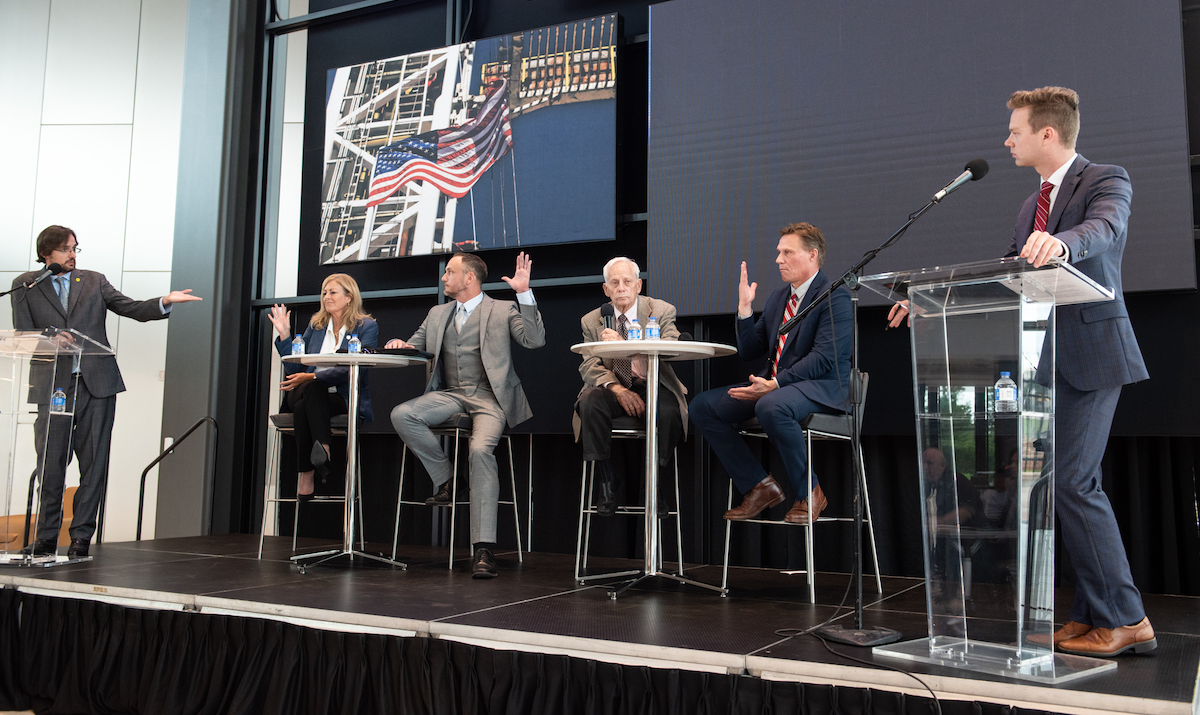
The candidates disagreed slightly in the debate’s second round, which focused predominantly on the topic electric utilities. In discussing cases where utilities ask the Corporation Commission for approval to increase the rates they charge customers, three of the four candidates committed to requiring electric companies to submit updated plans for foliage containment and disaster contingencies.
David recalled an ice storm more than a decade ago that broke numerous limbs on trees and knocked out electricity.
“We couldn’t leave the house without a chainsaw, but because of all that breakage and all the lines being down, we couldn’t get power to us for three weeks,” David said. “It was desperate times in my area of the state. What we learned from that is that it’s really important — no how much we hate that the electric company comes and trims our limbs back — it’s really important when it comes to winter because it saves us and it keeps the power on.”
Hornback and Thomsen also said they would support requiring utilities to submit disaster contingency plans when seeking rate increases. Spradling, however, said he did not.
The candidates split along the same lines regarding the securitization of debt from the shocking utility bills caused by the historic February 2021 ice storm. The process involves bundling ratepayer debt and selling bonds through the Oklahoma Development Finance Authority to pay off the existing debt this year and then repay the lower-interest bonds over decades with new tariffs on electricity and gas bills.
That 2021 storm shut down several energy sources across the Midwest and caused widespread power outages in Oklahoma and Texas, as well as other parts of the country. In Texas, 246 people died who were without power during sub-freezing weather conditions.
David, who helped develop the subsequent utility bill securitization programs in the Legislature, expressed the strongest support for the now-approved plans. She said securitizing the debts was the right thing to do to protect ratepayers from catastrophic costs after fuel prices rose rapidly during the storm.
“I will tell you we spent a lot of long hours,” David said. “We had the Corporation Commission at the table. Look, the current law is those costs — the costs of power — are passed down to the consumer. If we hadn’t stepped in and done something and (had) let those costs be pushed directly through — if those costs had been pushed directly through to the consumer, it would have bankrupted families. It would have bankrupted businesses. We would have had communities that were going to be bankrupted. We would have towns without power because the power company there would have been bankrupted.”
The individual securitization plans pursued by companies like OG&E, ONG and PSO have had to receive approval from the three-member Corporation Commission, which voted 2-1 on each one. David said she stands by the Legislature’s decision to create the securitization programs and would have voted in favor of the plans had she been on the Corporation Commission this year.
“We had to come up with a solution,” she said. “It wasn’t easy to come up with that decision, but what we did was look at how other states dealt with those disasters and they do securitization. That allowed utilities to bond that debt at the lowest rate possible using the ratepayer as the payer. That was the best solution. It was the cheapest solution for the ratepayer. I know no one likes to see that cost on their bill, but no one would have liked to have gotten a gas bill for $3,000 and an electric bill for $2,800. It was unsustainable. I felt like it was the right thing to do at the time, and I still do.”
Thomsen initially avoided saying whether he would have voted for or against the companies’ securitization plans had he been on the Corporation Commission this year. Pressed on the question, he said he would have leaned toward favoring the proposals.
“I would have to learn all the factors about it if I was faced with a decision like that myself,” he said. “From a distance, I would say I would have probably voted for that because it’s a once-in-a-lifetime type of weather event that took place. The responsibility, the money that would have been passed along to the consumer, people wouldn’t have been able to pay for that. In a one-off, I think it was a very smart move to give an option so that monthly bills don’t go up as excessively.”
Two other candidates — Harold Spradling and Justin Hornback — said they would review cases on an individual basis.
Hornback, who is a representative for the Pipeliners Union 798 in Tulsa and who has worked in the oil industry, said he wasn’t sure if securitization works in every instance.
“It really needs to be looked at on a case-by-case basis,” he said. “In this specific case, securitization is a powerful tool. It was one of the four options that did make sense for Oklahoma. But diversification is the name of the game. There’s not a one-size-fits-all answer. There’s not 100 percent yes or no. Like I said before, you have to take a look at each specific incident and case and understand all of the information.”
Ultimately, Hornback said he would have leaned toward approving the securitization agreements.
Spradling disagreed, warning there could be other large storms in the future.
“I was on the no side,” he said. “This was a bill passed by the Legislature for this one issue. Are we going to do these kinds of things every time? Securitization means we’re just going to protect ourselves from what possibly might happen. The theory is good, but it doesn’t have to be done that way every time there is a storm.”
David, Thomsen focus on their backgrounds
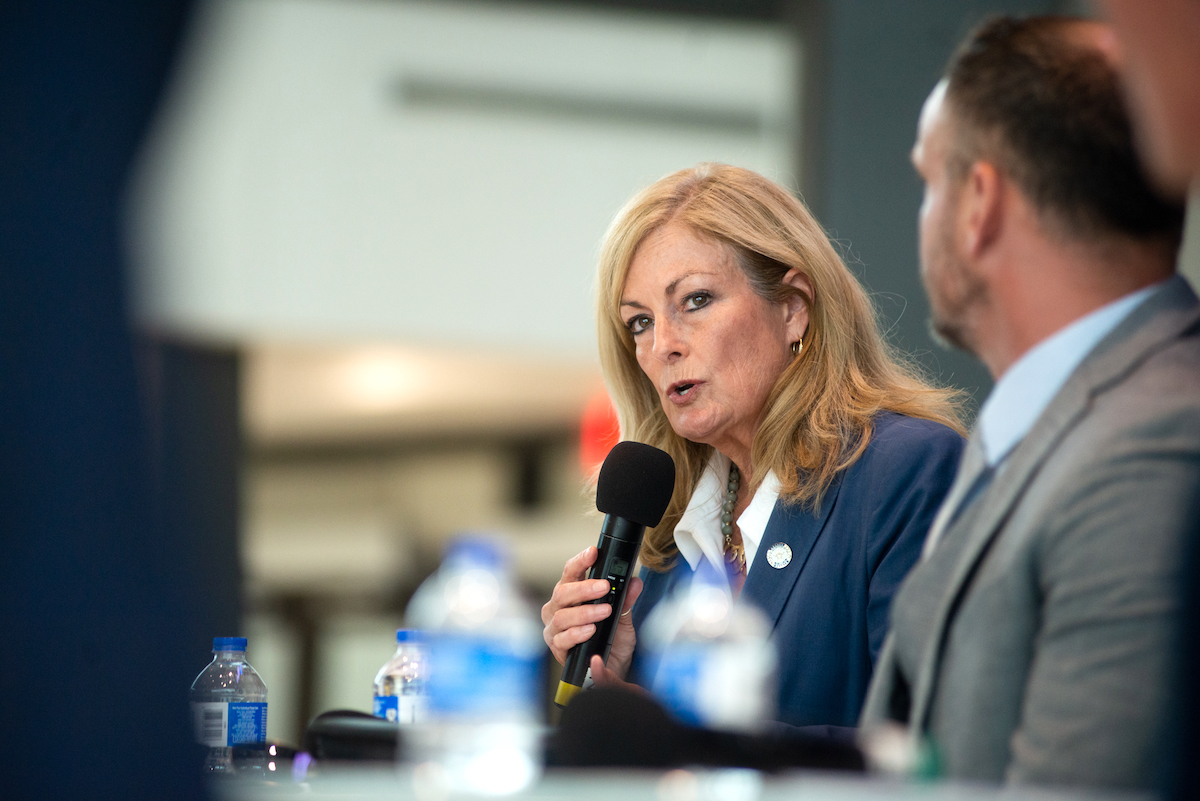
When asked to identify the biggest difference between them, neither Thomsen nor David drew much of a contrast with each other. Both served 12 years in the Legislature and both are from eastern Oklahoma.
“I think I’m taller,” Thomsen joked. “I’m not looking at what is different but who I am — what I’ve learned over the years. What I’ve learned as a legislator. What I’ve learned in the FCA ministry and what I’ve learned as an athlete and what those things have created in me. It is things like team building and building a consensus and listening. Those kinds of things where you are a solution-finder. That’s what I think makes me who I am.”
Rather than contrast herself with Thomsen — the only other GOP candidate who has reported fundraising and campaign expenditures in the race — David pivoted to her own accomplishments.
“As a woman in the Senate, I was the first appropriations chairwoman during the two worst budget years,” she said. “In that time, I proved during that time I was really good at bringing people together to come up with the best solutions. We made some really hard decisions during those two years. I still have a little PTSD thinking back on how hard those days were. But what that shows is I will work tirelessly to find the right answer. You can’t out work me.”
Hornback: ‘I’d rather not owe anyone if elected’

Hornback is running a campaign without soliciting donations or spending money beyond his personal travel. He has not registered a campaign committee with the Ethics Commission, and he said he doesn’t need money to make people aware of who he is.
“I’ve talked to a lot of people through social media,” he said. “I give out my card. I’ve had people email me, and I’ve had people call and text me. There are plenty of free or low-cost ways to get your message out. I’d rather not owe anyone if elected.”
David took issue with Hornback’s insinuation that taking campaign donations equates to owing people things if elected.
“I can’t be bought. Raising money is not saying you are beholden to somebody because they are supporting your campaign,” David said. “People supporting your campaign means they are supporting you.”
Hornback acknowledged his disadvantage in not raising money.
“Is it limiting? Yes. Does it hurt my campaign? Absolutely,” he said. “But I also appreciate the chances to meet people and tell them why I want to represent them. I think that’s what the people of Oklahoma want to see. They are tired of issues like Epic and Swadley’s.”
After leaving the Legislature, Thomsen worked in a community relations role with Epic Charter Schools while the organization and its founders were under criminal investigation for alleged misuses of state funding.
“I joke with people that I wanted to get out of controversy so I went to work for Epic,” he said. “But have you ever been to an Epic graduation? If you go to a graduation, you will see thousands of kids that, but for that option, they would not have graduated. Epic isn’t the place for every kid, but it’s a place for certain kids who may not fit in. If you see those graduations, it’s inspiring. My job there was to connect teachers and students with legislators and community leaders. For me, it was an honor to do that.”
Thomsen said he didn’t know whether laws were broken at Epic during his time there because he was laid off by the organization.
“I didn’t dig into the weeds of what was going on because I was RIF’d,” he said.
Spradling: ‘You should run’
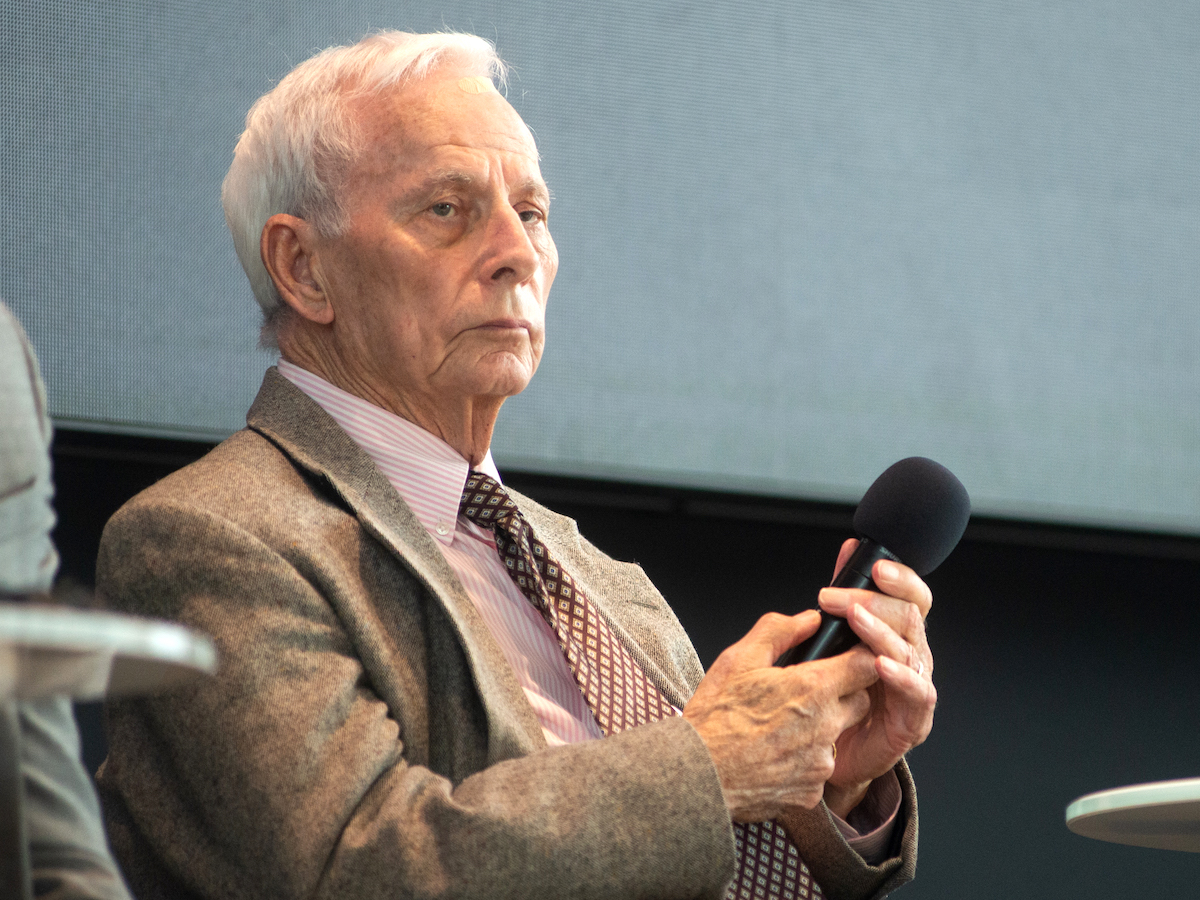
Spradling said he was the most qualified candidate for the job of corporation commissioner because of his extensive experience working in a variety of industries, including oil and gas and even railroads during his 88 years.
He also encouraged more people to run for office in Oklahoma.
“As I’ve told people I meet during the campaign, if you believe you are better than your county commissioner or representative, then you should run,” he said. “And I may run again someday after this if I think I’m better than my opponents at the job.”
Other upcoming 2022 primary debates
As part of NonDoc’s broader 2022 public debate series, the following primary election debates also have been scheduled:









